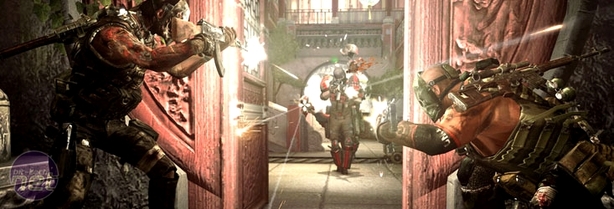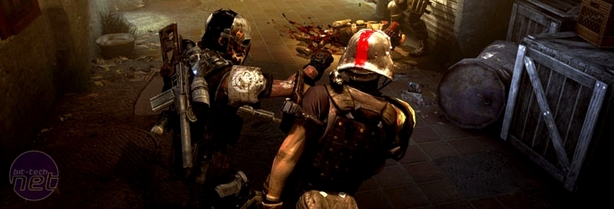
The 41st Day
One of the problems we occasionally come across when we’re reviewing games and such, is the overwhelming level of duplication that occurs within the industry; there are a stunning amount of almost identical third-person shooters on the market, with the same controls, mechanics and ideas getting broached over and over.It raises the problem of how to describe the game in an entertaining and new way each time when all you really need to say is “it’s like Gear of War, but clunkier.” It’s a problem we think EA must have also stumbled upon as they tried to work out a way to make Army of Two different from the first game and the dozens of other shooters that the original also aped.
The solution the studio seems to have gone with for the most part is, again, the simplest one available; don’t.
If you’ve played Army of Two, or any other recent third person shooter, then you’ll pretty much know what you’re letting yourself in for because it’s mostly unchanged. There’s a cover system, guides which show the trajectory of your grenades and you use the left trigger to aim, right trigger to fire. It really is a clunkier version of Gears of War.
There are some nice tweaks and flourishes, some new and some that were original in the first game and have been carried over, and while some of them are genuinely useful – such as clicking the right thumbstick to switch the camera to the other shoulder and give a better view from cover – most aren’t. The system of fist-bumps and ass-slaps has been expanded to allow for quick games of rock-paper-scissors, for example.
Balancing out the fact that the controls and core features of the game are largely the same as they’ve always been is the addition of some new events in the singleplayer campaign, which you stumble across semi-regularly. There are basically three different types of event; morality, stealth and quickdraw. Morality events are where you have a chance to save some civvies, either by killing or capturing guards. Stealth sequences involve clearing an area without setting off alarms. Quickdraws are by far the rarest events and involve mock-surrender and surprise attacks.
Each one of these is based on the age-old formula of risk and reward, though the pay-offs usually aren’t apparent immediately. It’s harder (but not at all difficult) to capture guards and rescue civilians and you won’t get anything for it straight away, but if you do it enough you can unlock some nice gear further into the game by doing many good deeds. Conversely, morality events offer a bonus straightaway if you’re willing to play the bad guy.
The rewards themselves usually come in the obvious form of either cash or firepower, both of which are useful in the larger than ever weapon customisation portion of the game where you can add grips, stocks and scopes to your guns. Whether you choose to go the evil or nice route though you’re usually treated to a quick parade of cartoon images that explain the consequences of your choice before letting you continue.
Our favourite example of this new morality system occurs in a rather odd portion of the story where you battle through Shanghai zoo, guided by a security guard who keeps prattling on about his destiny and duty to protect the animals before pointing out a cool-looking gun that fell into the tiger pen. The binary choice promptly appears; will you shoot the kitty to grab the shotty?
If you do kill the cat then you get a blast of tearful images revealing you just wiped out the species. If you don’t then…well, we don’t know, to be honest. Tiger’s are vicious things, so we always shot it and moved swiftly on.

MSI MPG Velox 100R Chassis Review
October 14 2021 | 15:04











Want to comment? Please log in.